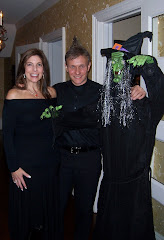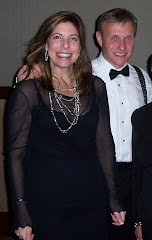I know I'm opening up a can of worms, but I'm going to tackle a tough topic -- Gossip. And before I get into the nitty gritty, I'll admit, I gossip and participate in gossip by listening to it. What I would like to believe is that what I say isn't hurtful or damaging and when I gossip it's with friends who know the kind of person I am. It might sound bit harsh, but I'd venture to say that people who say they never gossip are probably lying.
Is gossip always bad? And if gossip is bad, is the gossiper necessarily a bad person?
A couple of years ago, my brother gave me a book called The Four Agreements by Don Miguel Ruiz. The premise of the book was to try to teach the reader how to be a righteous person by agreeing to do 4 simple things. The first agreement is, "Be impeccable with your word". The author asks the reader to say only kind and truthful things; to be aware of what you are saying and how you say it. When I called my brother weeks later and told him that I was really working hard on being impeccable with my word, he said, "great, now work on your thoughts".
I took on the first agreement with a vengeance. When friends or acquaintances talked about others, I tried not to be pulled into the conversation, or when I heard someone say something that wasn't impeccable, I told them so and then explained what being impeccable meant and where I learned this. When I told a friend of mine that I was working on being impeccable with my words, she told me about Lashon Hara. She explained that in the Jewish religion, saying truthful remarks about anyone--be it good or bad--is called Lashon Hara. It doesn't matter if you say something nice [like "Isn't she pretty"], because this statement could invoke jealousy in the other person and cause them to say or even think Lashon Hara. My friend told me that the best thing you can do is never talk about anyone. I asked her if this was possible and she said yes - that her husband won't talk about other people at all and when she wants to vent about someone or participate in idle gossip, he won't listen because by her speaking to him about these people, she is causing him to participate in Lashon Hara. Oy Vey! This was hard for me to fathom. Wasn't trying to be impeccable with my word good enough? And to be truthful, I was beginning to miss "sharing information".
When does a fun and interesting chit chat amongst friends become gossip? I really want to know. The word gossip has a negative connotation. I believe that true gossip is hurtful and mean and I think it is also when the people sharing are getting more out of the sharing than just the information; where cruel thoughts are conjured and where delight at someone else's misfortune is felt. Roget defines gossip as, "idle, often sensational and groundless talk about others". Wikipedia says, "gossip is idle talk or rumor especially about the personal or private affairs of others". Neither one of these definitions says anything about gossip being nasty, mean or hurtful, but in our hearts we know when our exchanging of information becomes gossip. And what about people we know who are good and nice and exchange information? Are they gossipers? Are they bad people? Don't get me wrong, I live in a glass house, so I'm not throwing any stones.
I think there should be another word to refer to the event of friends exchanging information where there is no malice nor hurtful intention. I remember reading in one of my Psychology classes in college that gossip between two people is a friendship ritual, it brings people closer. It's a shared intimacy. This is what friends do. Conni Sharp, an Associate Professor of Psychology and Counseling, says that although gossip usually has a negative connotation, it can sometimes serve the purpose of spreading information. For example, finding out about sick neighbors, the death of a pet or a car accident is sometimes learned through "nature's telephone". See, this is what I mean. There should be another word besides gossip for this kind of information sharing. Putting aside Lashon Hara [because you can't talk about anybody, good or bad], why can't I hear about something in someone's life and just take it for what it is---namely, information?
The other day I was sitting with some good friends and one of them was telling the story of this couple who were separated, who then got back together, who then separated again and finally got divorced. I happen to know this couple, but am not friendly with them nor do I move in the same social circle. This information was just that: information. I thought to myself, hmm, that's sad, poor kids, and so on. It made some things clearer to me about stuff I had heard in the past, but did this story make my heart beat faster, my pupils dilate in fascination or make me feel better for knowing? NO! Did my friend telling this story get pleasure from relaying this information? I can tell you definitely not. If anything, it made us all feel sad and more importantly grateful for what we have. Professor Sharp validated these feelings. She says,"By talking about other people's difficulties, we discover that they don't have perfect lives and this makes us realize that we are not the only ones with problems'.
I would love to get into the whole gossip thing as it relates to men vs. women, but that would make this babble even longer. Let me just say, why is it that a man can say to another man, "Hey Joe, did you know that John isn't living with Jane anymore?" and it not be considered gossip, but if this question is asked between two women, it's considered gossip? I think there is an unfairness here. Some of my best gossip sessions have been with men. Interestingly, as I write that sentence, I wonder if they would consider what we talked about gossip? Sharon Shepherd, a marriage counselor, says, "While gossip among women is universally ridiculed as low and trivial, gossip among men is called theory, or idea or fact". Perhaps it comes down to this: It's not just how something is presented, it's also who is sharing the information.
I'll end on this note. The only time we dislike scuttlebutt is when it is pointed at us. To help ensure that I keep the finger pointed away from me and mine, I will continue to strive to be impeccable with my word, and as Eckert Toller [who wrote The New Earth] recommends, I'll try not to "get drawn into other people's drama". I never did get around to sharing the other three agreements with you, but for the purpose of this babble, I'll end with the 4th Agreement. This one states: Always do your best!
COCO GROOMED TODAY
2 hours ago






No comments:
Post a Comment